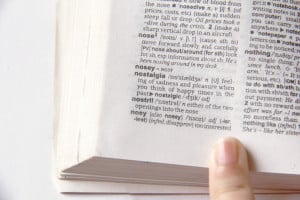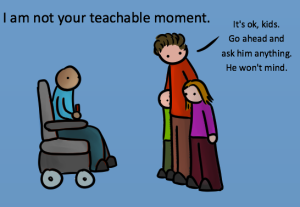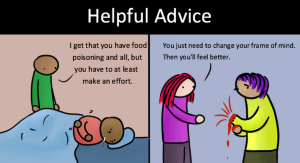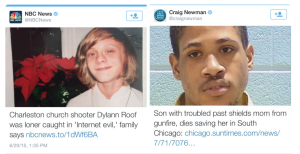Panel 1
A man pulls a punch in the direction of a woman. She cowers away.
Text: A lot of times people have this misconception that relationships with abusive people always involve physical violence.
Panel 2
Image pans out to a couple watching the punching scene on the television.
Text: Because of how it is portrayed in the media.
Panel 3
Three images stacked diagonally atop each other. The first image is of a person with a terrified facial expression, forcing a kiss on their partner. The second is a hand sending excessive text messages. And the third is someone’s finger turning off someone else’s alarm.
Text: This can often make it hard to recognize when you have an abusive partner. In addition, we have been socialized to believe that people are entitled to certain behaviors, ranging from sex, to attention, to time,
Panel 4
The image is a black silhouette of person with arms open to indicate that they are vulnerably exposing themselves.
Text: To changing ourselves for our partners.
Panel 5
The image is all black with white letters.
Text: And because of this, certain behaviors can go unnoticed or feel justified when really they are incredibly toxic and dangerous to your emotional and mental health.
Panel 6
Person stands with arms crossed. They look concerned and there are question marks all around them.
Text: So how do you know if your partner is exhibiting abusive behavior?
Panel 7
The image is all black with white letters.
Text: Here are 7 questions you can ask yourself.
Panel 8
A person on the right shouts at a girl in front of friends who were chatting on the couch.
Text: 1. Do they humiliate or embarrass you in front of others?
Panel 9
A woman pulls her partner away as they look longingly at the friend group they wish they could spend time with.
Text: 2. Do they control where you can go, when you go, and who you’re with?
Panel 10
A person holds a phone with many one sided texts.
Text: 3. Does your partner call, text, or e-mail at excessive rates?
Panel 11
A partner looks over woman’s shoulder as she checks texts. The partner looks angry and the woman looks concerned.
Text: 4. Do they act over possessive or get jealous for no reason?
Panel 12
A close up of a man’s face. He looks frightened.
Text: 5. Do they make you feel scared, anxious, or like you’re walking on eggshells?
Panel 13
An image of broken phone.
Text: 6. Do they disrespect or destroy your belongings?
Panel 14
A person looks upset. Speech bubbles indicate the person is talking about pills and scissors, suggesting they may hurt themselves.
Text: 7 Does your partner threaten to hurt themselves or you?
Panel 15
Text: If you answered yes to the above, you might have an emotionally or verbally abusive partner. What does this mean? It means that your partner might be using tactics like intimidation, manipulation, or refusal to be pleased to maintain power in the relationship. But how would I know for sure? Though it’s easy to say “watch out for ______,” in real life, these behaviors can manifest in even more subtle ways.
Panel 16
Text: Control can be subtle.
Panel 17
Person 1 checks her phone and looks excited. Her partner, Person 2, has their arms around her, and grimaces while watching her check her phone.
Person 1: Oh! I just got invited to a party with some friends! That would be fun…
Panel 18
Person 2 expresses dissatisfaction, while Person 1 seems worried about person 2’s dissatisfaction.
Person 2: You know I don’t like it when you go out drinking without me. I don’t think you should go out.
Panel 19
Person 2 takes the phone out of person 1’s hand, smiling and content. Person one looks disappointed and has their arms crossed around their chest.
Person 2: In fact, I’ll let your friends know you’re not free. Let me take care of it.
Person 1: Okay…
Panel 20
Text: Guilt and manipulation come in all sorts of different mediums.
Panel 21
A person’s black silhouette looks at a phone and starts crying.
Panel 22
Text messages talking about self-harm are displayed on the phone screen.
Text messages: “I need you. You’re the only reason I can live with my depression.” “If you leave me I swear I’ll kill myself.” “This is your fault. I wouldn’t be this depressed if you didn’t try to leave me.” “You don’t love me anymore, you probably wouldn’t care if I were dead.”
Panel 23
Narrator: Your time and choices slowly stop becoming yours.
Panel 24
Two men are cuddling in bed. Both seem content.
Person 1: This was really nice…
Person 2: Yeah it was.
Panel 25
Person 1 starts to get out of bed because he has to get to work. Person two looks hurt.
Person 1: Oh man, I should go though, I have work soon.
Person 2: No don’t go…
Panel 26
Person 2 grabs Person 1’s arm. He asks him not to leave, and person 2 seems apologetic and slightly concerned.
Person 2: I want you to spend time with me.
Person 1: But, it’s work… I can’t.
Panel 27
Person 2 sneakily gets up to turn off the alarm clock while Person 1 sleeps.
Text: A week later.
Panel 28
Image of alarm clock saying “Dismiss.”
Panel 29
Person 2 returns to bed, content that he gets to keep Person 1 to himself, whilet sabotaging his chances of getting to work.
Person 1: No distractions this time…
Panel 30
Text: Sometimes it can be hard to tell whether or not you’re experiencing an overreaction or a manifestation of toxic behavior. But if you find yourself constantly justifying their behavior, it’s okay to be upset and be concerned. You are entitled to want the best even if you partner’s intentions are not malicious.
Panel 31
Text: So what now? The first thing to know is that, you are not to blame for not noticing, nor is it your fault that you are being treated unfairly. Again, because of the way we have been conditioned, we often believe we don’t deserve better, or that our partners are entitled to our bodies, choices, and time. But know that it is never okay for someone to say or do anything that lowers your self-esteem, that is meant to scare you into line, or that is meant to guilt you into sacrificing your mental health or agency. You are entitled to speak up, ask for help, and tell yourself you deserve better.





















